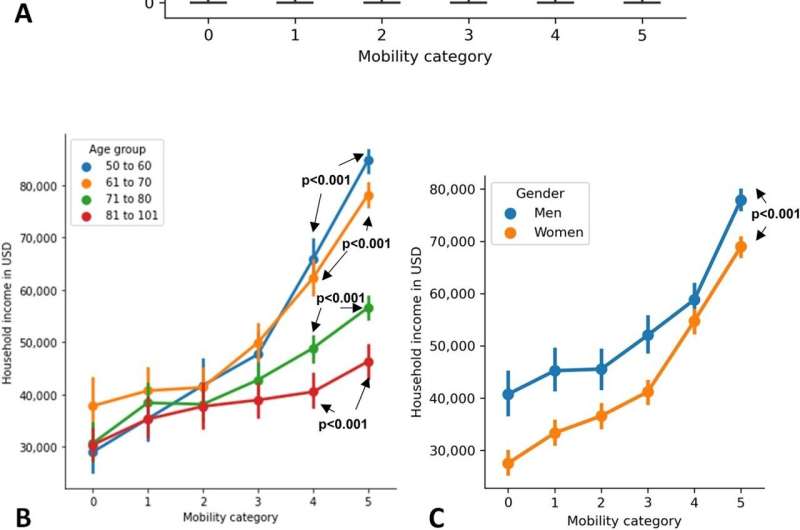This article has been reviewed according to Science X's editorial process and policies. Editors have highlighted the following attributes while ensuring the content's credibility:
fact-checked
peer-reviewed publication
trusted source
proofread
Higher income and longer working years are linked to better mobility

A new study on the relationship between mobility and income has shown that better mobility was strongly associated with higher income and longer working years in adults. The findings, from researchers at the National Institute of Arthritis and Musculoskeletal and Skin Diseases (NIAMS), part of the National Institutes of Health, also suggest that maintaining mobility was linked to greater earnings over time. The study was published in Clinical Orthopaedics and Related Research.
"We have long understood that greater mobility is an important indicator of good health," said NIAMS Director Lindsey A. Criswell, M.D., M.P.H. "The notion that mobility can have economic rewards further extends the evidence for the benefits of exercise and maintaining an active lifestyle."
Timothy Bhattacharyya, M.D., head of the NIAMS Clinical and Investigative Orthopaedics Surgery Unit, led the study. Bhattacharyya and colleagues analyzed data from the federally supported Health and Retirement Study (HERS), the largest representative longitudinal study of Americans over age 50, which explores the challenges associated with aging on work, health, social, psychological, family, and economic status.
Bhattacharyya and his team first measured the association between household income and mobility in more than 19,000 HERS participants who responded to the survey in 2016. Participants were assigned to one of six mobility levels based on their ability to complete a series of tasks—walking several blocks, walking one block, walking across a room, climbing several flights of stairs, and climbing one flight of stairs. A level 5 represented "unrestricted" mobility, while a level 0 indicated difficulty with all the mobility tasks.
"For every level drop in mobility, participants faced a reduction of more than $3,000 in annual income," said Bhattacharyya.
Next, the researchers evaluated the association between maintaining mobility and income. They identified a second group of individuals with unrestricted mobility who responded to the survey a total of three times: once in 2000 and two additional times by 2010. Those who maintained their mobility over the decade had incomes that were $6,500 higher than their less-mobile counterparts and were more likely to be employed.
Last, the researchers explored the role of exercise in maintaining mobility in a cohort of participants who were 60-80 years old in 2012. The researchers conducted follow-up assessments at two and four years from the initial response. Those who were able to maintain mobility after the age of 55 had a 19-point higher likelihood of maintaining an active working status. Engaging in exercise just once per week significantly boosted mobility scores over time.
"I suspect that—like exercise—other approaches that benefit mobility may have a positive association with income. The next step is to study whether interventions that improve mobility are linked to improving income," said Bhattacharyya, who is an orthopedic surgeon.
More information: Alex Pu et al, Better Mobility Is Associated With Higher Incomes and Longer Working Years Among Older Adults, Clinical Orthopaedics & Related Research (2023). DOI: 10.1097/CORR.0000000000002886





















